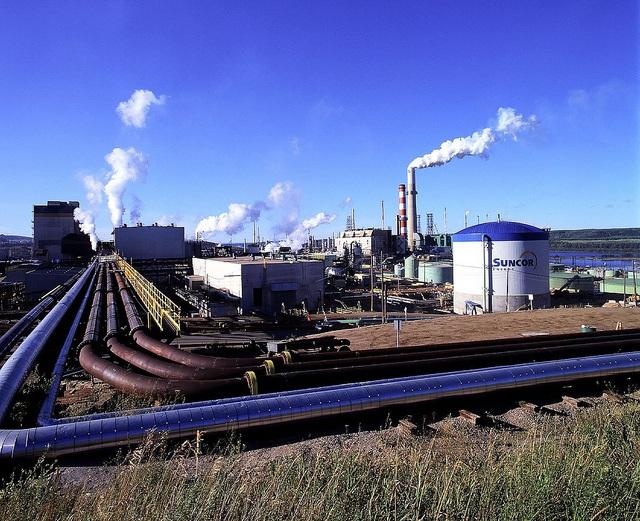
While energy companies here in the U.S., including ExxonMobil, balk at any discussion of climate change, one company north of the border is embracing a shareholder resolution that would require the public disclosure of information about its future climate-related performance.
Suncor, a US$ 31 billion (CAD$40 billion) integrated energy giant based in Calgary, Alberta, is advising its shareholders to vote “yes” on a proposal that mandates the company to disclose how it is moving forward as the world turns toward a low-carbon economy. The results will be officially announced at Suncor’s annual meeting in Calgary next month.
Critics of Alberta’s oil sands development, which despite current low energy prices is set to increase both in production and carbon emissions, will be encouraged by the decision of Suncor’s management to avoid a fight over this proposal. The company is a perennial a target of criticism by advocacy groups across Canada, including Sum of Us, which has long slammed the company’s sustainability performance.
Recent political and economic realities, however, have besieged oil sands investors. Oil prices have long helped fuel Canada’s economic growth, but worldwide prices have plunged over the past 18 months, and in turn that trend has made oil sands extraction far less profitable.
Meanwhile, Canadians did a 180-degree turn last year, bouncing Conservative Prime Minister Stephen Harper from office after an almost 10-year run in favor of Justin Trudeau, who recently said Canada would align with the U.S. on climate change policies. Trudeau has suggested that Canada implement a nationwide carbon tax, but the details have left individual provinces bickering amongst themselves and the federal government.
To that end, Suncor’s CEO, Steve Williams, said on Tuesday that a carbon tax is the type of policy needed in order to move aggressively against climate change — a stance the company says it has taken since 2011.
Hence, while insisting that the oil sands are integral to meeting Canada’s energy needs, the company acknowledges that it “has a responsibility to address the environmental impacts of its operations and it strives to continuously raise the bar on environmental performance.” The resolution was proposed by NEI Investments, a mutual fund company based in Toronto.
Despite Suncor’s board and management’s encouragement for its supporters to vote for this shareholder resolution, the company is hardly shying away from its oil sands operations. In fact, on Tuesday the company announced the completion of its US$3 billion acquisition of Canadian Oil Sands, a company that had long extracted crude oil from the Athabasca oil sands in northeast Alberta. The company has a 50-year history of investment in the region and takes credit for innovation that has allowed the process of oil sands extraction and refining to become far more efficient and less carbon intensive.
As environmentalists point out, however, while the oil sands sector has become more efficient, it has also harvested far more oil, with a resulting emissions spike over the past few years.
Curiously, while suggesting to shareholders that they support more aggressive disclosures related to climate change, Suncor insists that they vote "no" on a proposal that would require the company to report on its lobbying activities and the amount it spends on such communications. Clearly those activities could be related to energy policy, but the company’s board and management insist that its disclosures are already sufficient. The company’s overall stance will not mollify all of its critics, but Suncor’s acceptance of climate change as a risk should send a message to its competitors —north and south of the border.
Image credit: Suncor (Flickr)

Leon Kaye has written for 3p since 2010 and become executive editor in 2018. His previous work includes writing for the Guardian as well as other online and print publications. In addition, he's worked in sales executive roles within technology and financial research companies, as well as for a public relations firm, for which he consulted with one of the globe’s leading sustainability initiatives. Currently living in Central California, he’s traveled to 70-plus countries and has lived and worked in South Korea, the United Arab Emirates and Uruguay.
Leon’s an alum of Fresno State, the University of Maryland, Baltimore County and the University of Southern California's Marshall Business School. He enjoys traveling abroad as well as exploring California’s Central Coast and the Sierra Nevadas.














